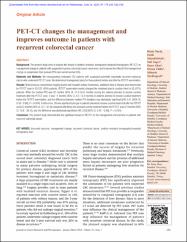| dc.contributor.author | Tural, Deniz | |
| dc.contributor.author | Selçukbiricik, Fatih | |
| dc.contributor.author | Sağer, Sait | |
| dc.contributor.author | Akar, Emre | |
| dc.contributor.author | Yıldız, Özcan | |
| dc.contributor.author | Serdengeçti, Süheyla | |
| dc.date.accessioned | 2020-06-24T15:57:37Z | |
| dc.date.available | 2020-06-24T15:57:37Z | |
| dc.date.issued | 2014 | en_US |
| dc.identifier.citation | Tural, D., Selçukbiricik, F., Sağer, S., Akar, E., Yıldız, Ö. ve Serdengeçti, S. (2014). PET-CT changes the management and improves outcome in patients with recurrent colorectal cancer. Journal of Cancer Research and Therapeutics, 10(1), 121-126. https://dx.doi.org/10.4103/0973-1482.131445 | en_US |
| dc.identifier.issn | 0973-1482 | |
| dc.identifier.issn | 1998-4138 | |
| dc.identifier.uri | https://hdl.handle.net/20.500.12511/5298 | |
| dc.identifier.uri | https://dx.doi.org/10.4103/0973-1482.131445 | |
| dc.description.abstract | Background: The present study aims to analyze the impact of positron emission tomography/computed tomography (PET/CT) on management change in patients with suspected or proven colorectal cancer recurrence, and to assess the effect of this management change on progression-free survival (PFS) and overall survival (OS). Materials and Methods: We retrospectively evaluated 122 patients with suspected potentially resectable recurrent colorectal cancer who underwent PET/CT scan. We determined management plans for these patients before and after the PET/CT examination. Results: While previous conventional imaging studies had revealed solitary metastases, additional sites of disease were determined by PET/CT scan in 52/122 (42%) patients. PET/CT examination results changed the treatment plan to curative intent in 35 (37%) patients. While the median PFS was 22 months (95% CI, 11.2-32.6 months) among the patients planned to receive curative treatment after the PET/CT scan, it was 11 months (95% CI, 8.1-13.9 months) in patients planned to receive curative treatment before the PET/CT examination, and the difference between median PFS durations was statistically significant (HR, 0.51 [95% CI, 0.32 - 0.88], P = 0.004). Furthermore, OS was significantly longer in patients planned to receive curative treatment after the PET/CT scan (27 months [95% CI, 22.1-31.9]) compared with those who received curative treatment before the PET/CT scan (21 months [95% CI, 15.6 - 26.4]), and the difference was statistically significant (HR, 0.63 [95% CI, 0.42 - 0.89], P = 0.045). Conclusion: The present study demonstrates the significant impact of PET/CT on the management and outcome in patients with recurrent colorectal cancer. | en_US |
| dc.language.iso | eng | en_US |
| dc.publisher | Medknow Publications | en_US |
| dc.rights | info:eu-repo/semantics/openAccess | en_US |
| dc.subject | Improved Outcome | en_US |
| dc.subject | Management Change | en_US |
| dc.subject | Recurrent Colorectal Cancer | en_US |
| dc.subject | Positron Emission Tomography/Computed Tomography Scan | en_US |
| dc.title | PET-CT changes the management and improves outcome in patients with recurrent colorectal cancer | en_US |
| dc.type | article | en_US |
| dc.relation.ispartof | Journal of Cancer Research and Therapeutics | en_US |
| dc.department | İstanbul Medipol Üniversitesi, Tıp Fakültesi, Dahili Tıp Bilimleri Bölümü, İç Hastalıkları Ana Bilim Dalı | en_US |
| dc.identifier.volume | 10 | en_US |
| dc.identifier.issue | 1 | en_US |
| dc.identifier.startpage | 121 | en_US |
| dc.identifier.endpage | 126 | en_US |
| dc.relation.publicationcategory | Makale - Uluslararası Hakemli Dergi - Kurum Öğretim Elemanı | en_US |
| dc.identifier.doi | 10.4103/0973-1482.131445 | en_US |
| dc.identifier.wosquality | Q4 | en_US |
| dc.identifier.scopusquality | Q3 | en_US |


















